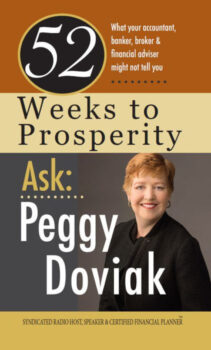Peggy Doviak, Ph.D., CFP®
 Hi, my name is Peggy Doviak, I’m a personal finance author, and I want to help you prosper! Each month, I’m going to blog about financial topics that writers need to understand. And this month it’s a biggie—treating your writing like a business rather than a hobby.
Hi, my name is Peggy Doviak, I’m a personal finance author, and I want to help you prosper! Each month, I’m going to blog about financial topics that writers need to understand. And this month it’s a biggie—treating your writing like a business rather than a hobby.
Whether you have a traditional publisher, you are an indie author, or you’re still working toward your goals, begin to think about your writing as a business rather than a hobby. It matters to you because it matters to the IRS.
The Internal Revenue Service has a set of guidelines commonly called “hobby-loss” rules. The simple explanation says if you have a hobby, you cannot deduct hobby-related expenses that cost more than the money you make at that hobby. On the other hand, if you run a business, the business can spend more money than it earns and operate at a loss. That loss can then be taken on your personal taxes as a reduction to other money you earned.
Let’s look at an example. Assume you earn a $200 prize from winning a writing contest (congrats!), and you have $1,000 of legitimate writing expenses that year. If your writing is a hobby, the loss you can take is limited to the $200 prize you earned as income, and the other $800 of expenses have no tax usefulness. However, if your writing is a business, you recognize the $200 income and the entire $1,000 loss. The $800 loss in excess of your income is reported on your personal taxes and can be used to lower any other income that you or your spouse earn. For instance, assume you earned $50,000 as a teacher. Your $800 writing loss would offset your teaching income, resulting in taxable income of $49,200.
Of course, no one wants to lose money! However, sometimes expenses can exceed your income, especially if you have just begun your writing career or are moving to a new level of marketing and promotion. If your losses exceed your gains, it’s particularly important that the IRS view your writing as a business, not a hobby. Fortunately, you can take some steps to help convince them of this.
- Keep a journal of the time you spend writing. You don’t need to write every day, but for the IRS to believe you are seriously trying to make a financial profit as a writer, your journal should indicate substantial and repetitive lengths of time.
- Keep financial records and receipts to justify any expenses. Take a picture of receipts if you tend to lose them.
- Only claim expenses that seem reasonable, and avoid extravagant purchases.
- Take classes or seminars to improve your writing skills, and keep records of these events.
- Pay any appropriate tax due on all income that you earn from writing.
- Keep contest entries or manuscript submissions, along with acceptance and rejection letters.
- If you make a profit in one year, that’s great! Pay your taxes happily because you are having success in your writing career. If you lose money the next year, you can take the loss again.
- Work with a Certified Public Accountant (CPA) and a CERTIFIED FINANCIAL PLANNERTM (CFP®) practitioner, preferably those who are familiar with writers’ expenses and income.
 You cannot run your writing business at a loss indefinitely; the IRS expects you eventually to make a profit! Further, the length of time you can claim a loss without showing a profit can be tricky, and you should talk to a CPA. However, each year if you show additional efforts and take new steps toward profitability, it will help the IRS see that you have a prosperous business, and your writing is much more than just a hobby.
You cannot run your writing business at a loss indefinitely; the IRS expects you eventually to make a profit! Further, the length of time you can claim a loss without showing a profit can be tricky, and you should talk to a CPA. However, each year if you show additional efforts and take new steps toward profitability, it will help the IRS see that you have a prosperous business, and your writing is much more than just a hobby.
The information in this blog is educational, not investment advice. Consult appropriate financial professionals before you implement any ideas that you read here. Past performance is not indication of future performance. Investing is risky, and you can lose money.












